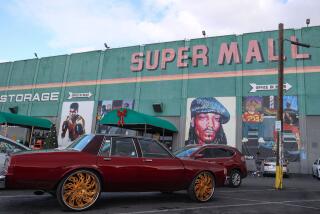
Though far past their heyday, swap meets in Southern California remain vibrant hubs of commerce — a working-class, in-person EBay. But they’re under siege from a virus that thrives in crowds.
- Share via
Elizabeth Vargas’ phone rang as she helped a group of women find a first Communion dress at her Paramount Swap Meet stand.
“How much?” one of the women asked, running her fingers along a white gown’s beaded lace.
“$110 for the package. Do you want to try it on? OK, go ahead,” Vargas, 47, told the women, bringing the phone to her ear.
After the women bought the dress, Vargas returned to her call. The news was not good: Her boss at a nightclub security company told her it had found someone younger who would accept less pay to replace her as the company staffed newly opened clubs.
Vargas shrugged. She had worked at the company for 22 years. But as long as the swap meet remained open, she would work extra days to get by.
“This is our daily bread,” she said, gesturing toward the vacant land on the Paramount Swap Meet lot. “If you see all the empty spaces, it’s because people don’t have the money to pay for the spaces.”
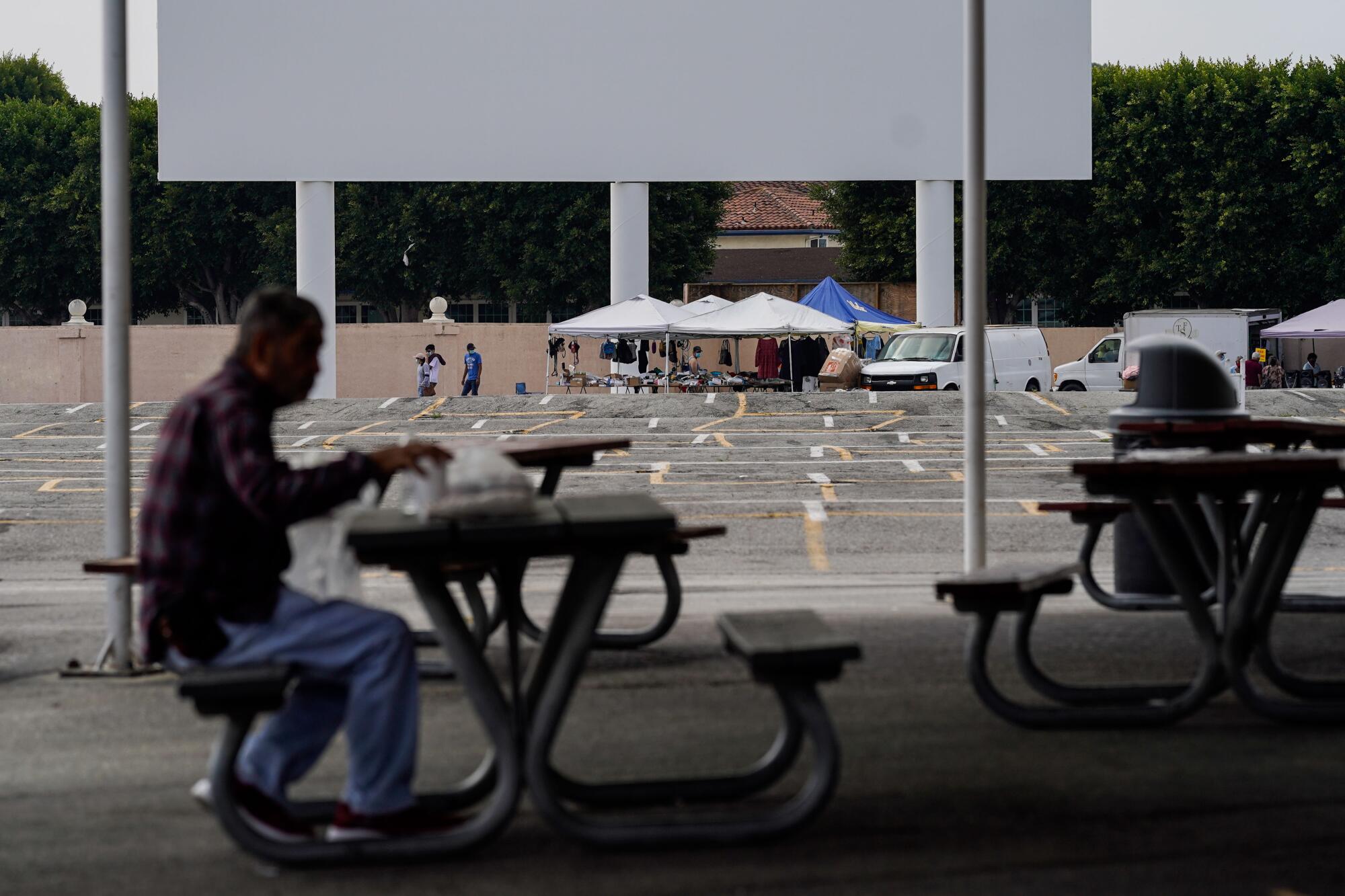
Though far removed from a heyday when they filled the parking lots of Southern California drive-in theaters and college campuses every weekend, swap meets remain vibrant hubs of commerce — a working-class, in-person EBay. They’re the kind of place where a vintage Schwinn, a $4 hoodie, a leather suitcase filled with eight-tracks, Slipknot T-shirts, Aztec calendars and a live cockatiel are all within a short stroll of one another.
Though some swap meets that were shut down by the pandemic began to bounce back after reopening in early June, others appear close to meeting their demise.
About 50 swap meet vendors at the Los Amigos Mall in South Los Angeles were served with a 30-day eviction notice in May, ordering them to pack their merchandise and leave by June 19.
On June 18, a security guard rolled the swap meet’s metal gate open for vendors going in and out with their belongings. Two U-Hauls waited outside as vendors loaded equipment, paperwork and merchandise. One displayed children’s toys and backpacks on the sidewalk, a last-ditch effort to make sales before the eviction.
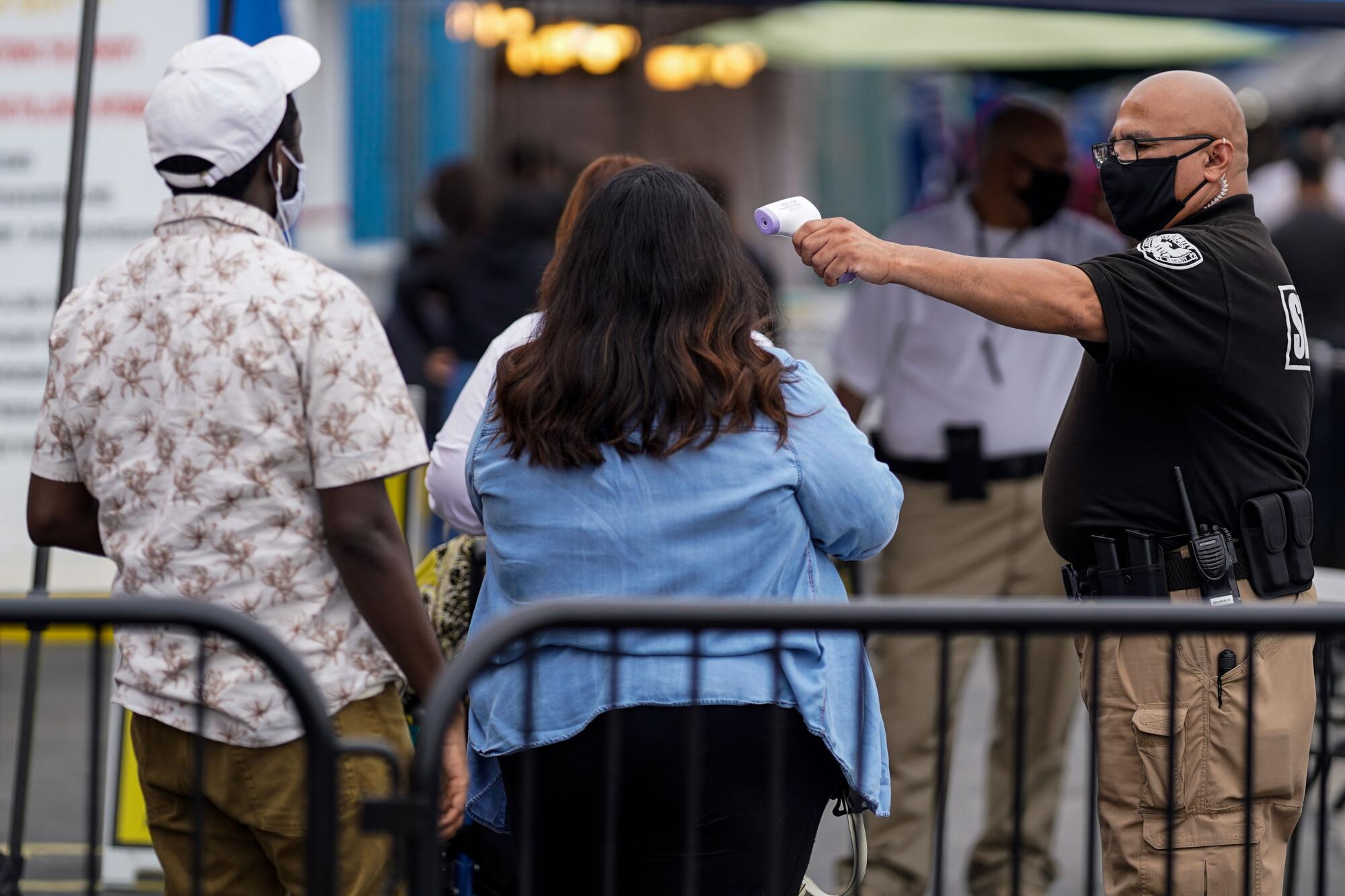
But during her visit to check on her stand, 61-year-old Rosa Maria Gonzalez had no intention of packing up her merchandise. The stand has allowed her to raise four children since she opened in 1991. Gonzalez planned to stay put until forced to leave.
“Why would I leave after 30 years of being there?” she said. “That’s an entire life. I’ve dedicated more time to that business than my kids, my house and my marriage. It’s unfair.”
Paul Lanctot, an organizer with the L.A. Tenants Union, said the organization is disputing the eviction notice and demanding a meeting to come up with a fair solution. As of June 25, many of the vendors hadn’t moved out.
“It’s a historic swap meet that a lot of folks have been going to for years and years,” Lanctot said. “What is going to replace it is unclear, but it doesn’t seem like it’ll be anything that will have the cultural importance that these businesses have given to the area.”
At the Paramount Swap Meet, Vargas said she guessed she was making about 60% of the sales she made pre-pandemic. With first Communion season around the corner, there’s hope of more sales.
“It’s not back to normal, but people are coming to shop,” said. “Catholics have faith.”
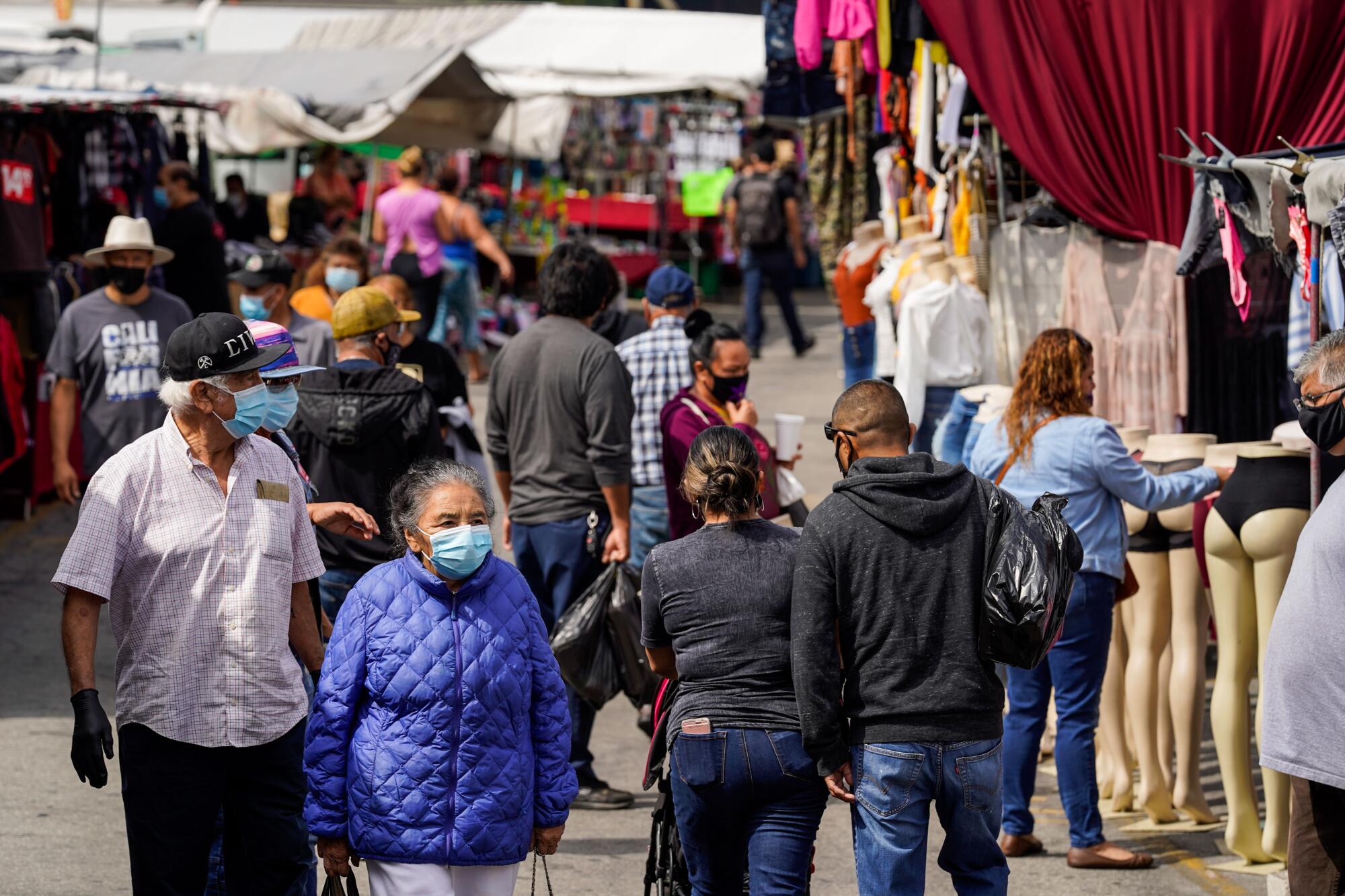
A few miles away at the Santa Fe Springs Swap Meet, Boyle Heights resident Claudio Eclicerio, 51, was also adjusting to getting back to business selling fruit.
He typically sells fruit on weekends. The other days of the week, he drives up and down California — to Fresno, Santa Clarita and Santa Barbara, visiting farms and sometimes picking the fruit himself. There’s no middleman, and he doesn’t take fruit that isn’t close to full ripeness.
On a recent weekend, though, his tables were a bit bare.
A strip of clear tape was wrapped around the stand to discourage touching. He asks customers to pick out the fruit they want, and he bags it for them. Hand sanitizer and paper towels are placed front and center.
“I love the swap meet,” said Eclicerio, who has sold at the Santa Fe location for 28 years.” “It’s a great thing because I interact with so many people. Every person I talk to has a story. Thanks to them, I’m here.”
Like Vargas, Eclicerio has seen a drop in sales. Fear of COVID-19 has kept many people away, he said.
“Things are slow,” he said. “It has affected us completely. People are scared.”
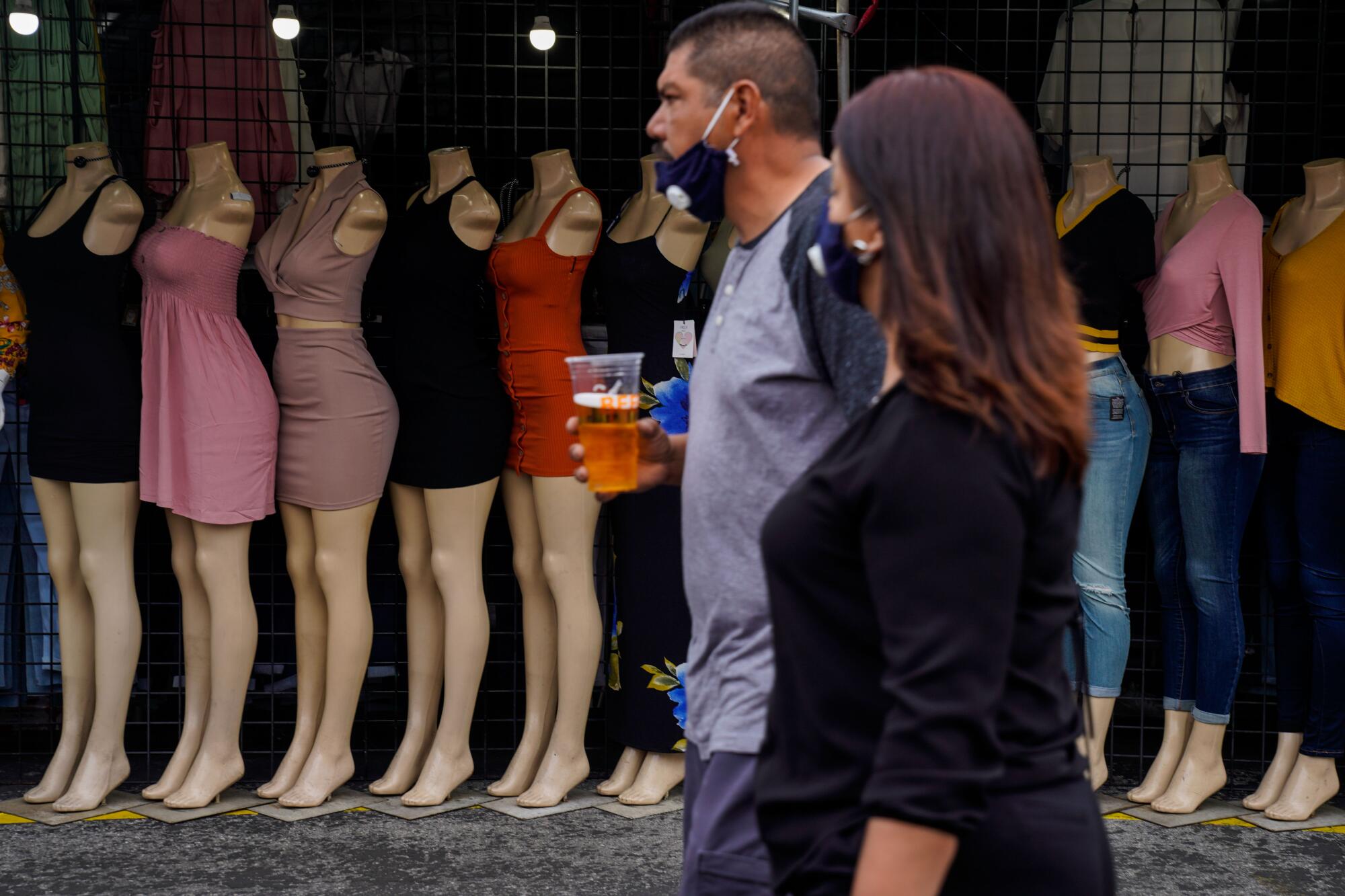
At first blush, this isn’t necessarily apparent. On this day, the 18-acre swap meet welcomed about 4,000 people, said Rick Landis, director of business development for the meet and incoming president of the National Flea Market Assn.
On the night before, a Friday, you wouldn’t have been able to hear your own words in a conversation, he said. Music boomed from large speakers and crowds were much larger.
The swap meet owners had invested millions in a newly renovated stage and patio area with the idea of holding $15 concerts on weekends and free entertainment throughout the week. It was part of a plan to keep the meet a viable business as rivals close down and the number of vendors slowly declines. More than 50 years ago, Santa Fe Springs hosted 700 vendors, Landis said. Today, it’s down to about 450.
After the pandemic shutdown, Landis estimated just about 75% of vendors and 60% of customers returned after reopening.
Still, Landis said he doesn’t think swap meets are going anywhere.
“Interestingly, sometimes during a recession the business goes up,” Landis said. “It’s counterintuitive. When there’s a recession, people are more careful. People are looking for bargains.”
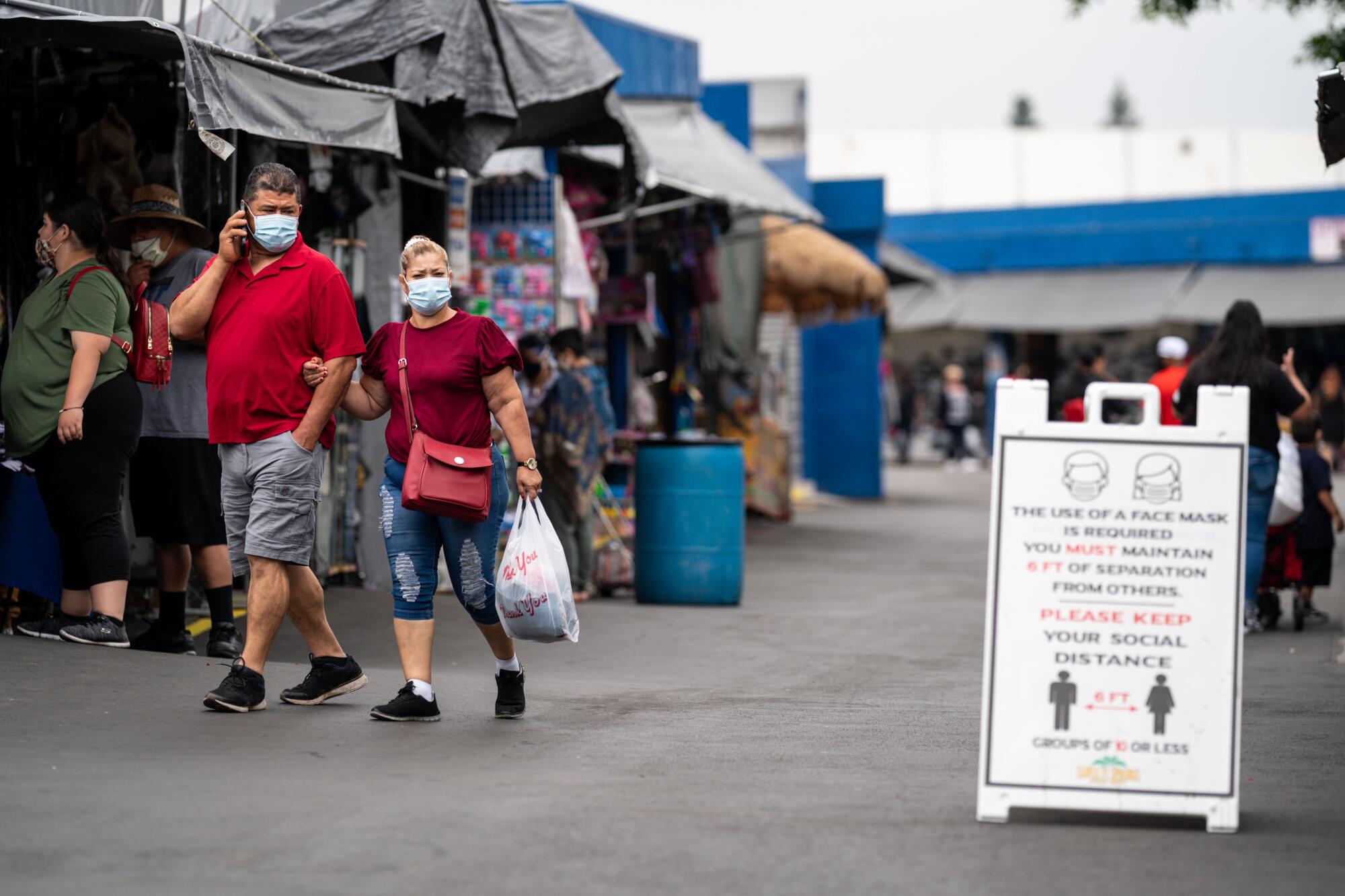
For La Mirada resident Jesse Herrera, 50, who owns food stands at several L.A. swap meets, business couldn’t be better. When he immigrated to Los Angeles from Mexico as a teenager, he started off by working at a Vernon warehouse that made churros. Noticing how profitable the business was, he decided to quit and run his own churro stand at the Santa Fe Springs meet.
The lone churro stand eventually multiplied to dozens of food stands across many swap meets in Los Angeles, as well as a restaurant business. Herrera also books entertainment and runs concessions for some swap meets.
“People thought I was crazy, and here I am today. I achieved the American dream at this swap meet.”
On Saturday at one of his hot dog stands, he had a healthy stream of customers who stood six feet apart on stickers marked for physical distancing. In the outdoor seating area, tables were spaced out.
Herrera said that while the swap meet was closed, he spent more time with family than he had in years. The unexpected break gave him time to reflect. Rather than expanding his business as he had planned, Herrera said it may be time to step back from work.
While Herrera makes plans for early retirement, vendors in central Los Angeles are being forced to think about next steps as they face eviction by landlords.
At the Alameda Swap Meet, 200 vendors were told they have to pay the several months of missed rent or face eviction, said Alfredo Gama, president of the Central-Alameda Neighborhood Council.
Swap meet closures wouldn’t only affect the culture of a community; they would mean one less place to purchase essential goods, Gama said. The nearest Walmart or Target is a 30-minute drive away, and the communities of Central-Alameda rely on the swap meets to find necessities like soap, clothing and food.
“We’ve been having a lot of discussions about defunding the police. This is where the money should go. To small businesses in communities of color,” he said.
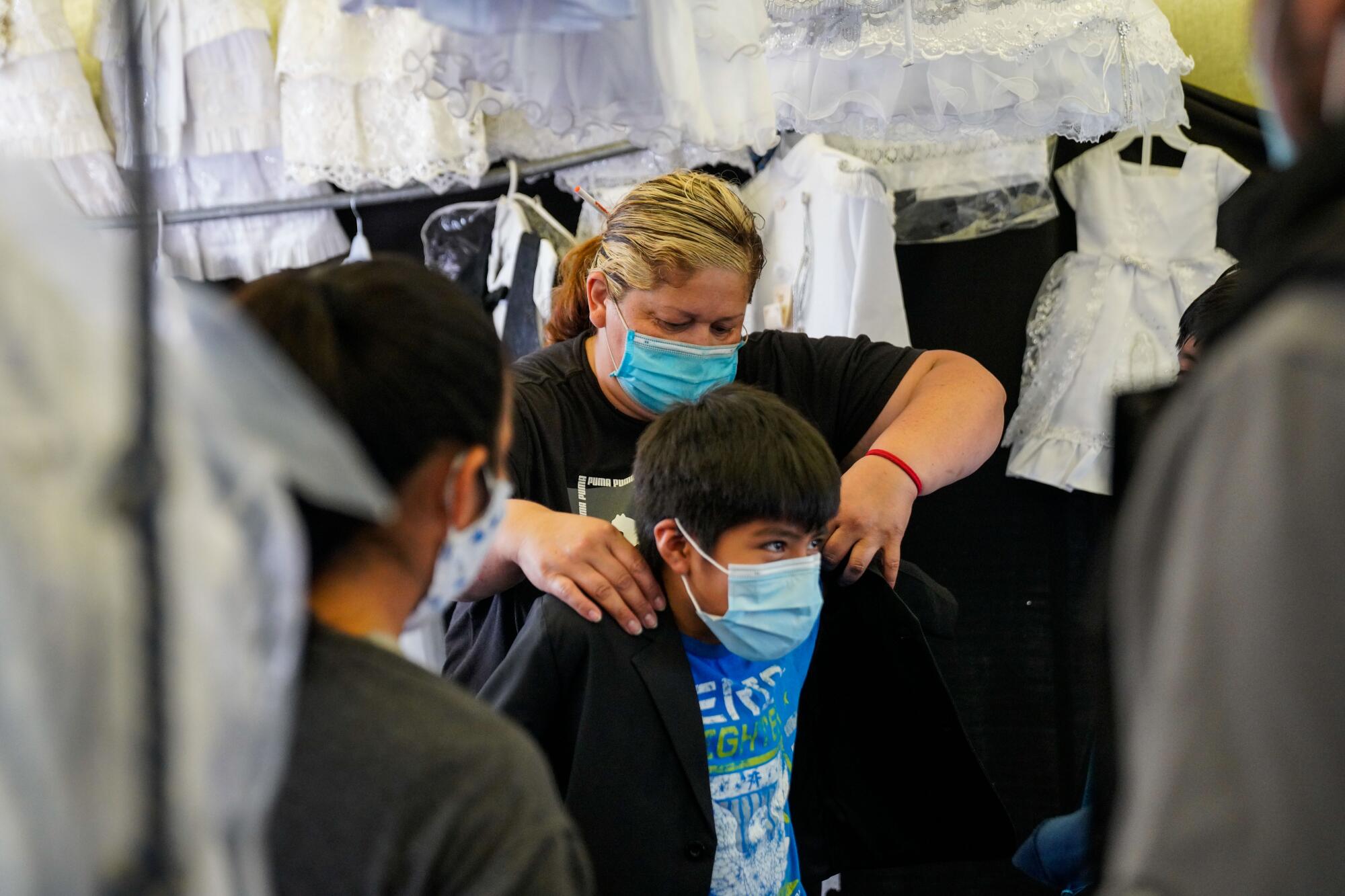
For Reyna Pascual, a 37-year-old Long Beach resident, the Paramount Swap Meet was her first stop in finding a suit for her son’s and godson’s first Communions.
Pascual is a factory worker who packages hand sanitizer and soaps. But several of her co-workers have tested positive for the coronavirus. She worried about infecting her son, who has asthma, so she decided to stop working. Her husband, Saul Vasquez, 40, who works in construction, is now the sole provider.
“At the swap meet, we find things at a better price. The economy is not so good, so we’re trying to save,” she said.
On a recent weekend, Pascual went to the Paramount location looking for a vendor whom she had purchased from before. When she arrived, the vendor’s spot was one of the many empty spaces in the lot. She turned to Vargas.
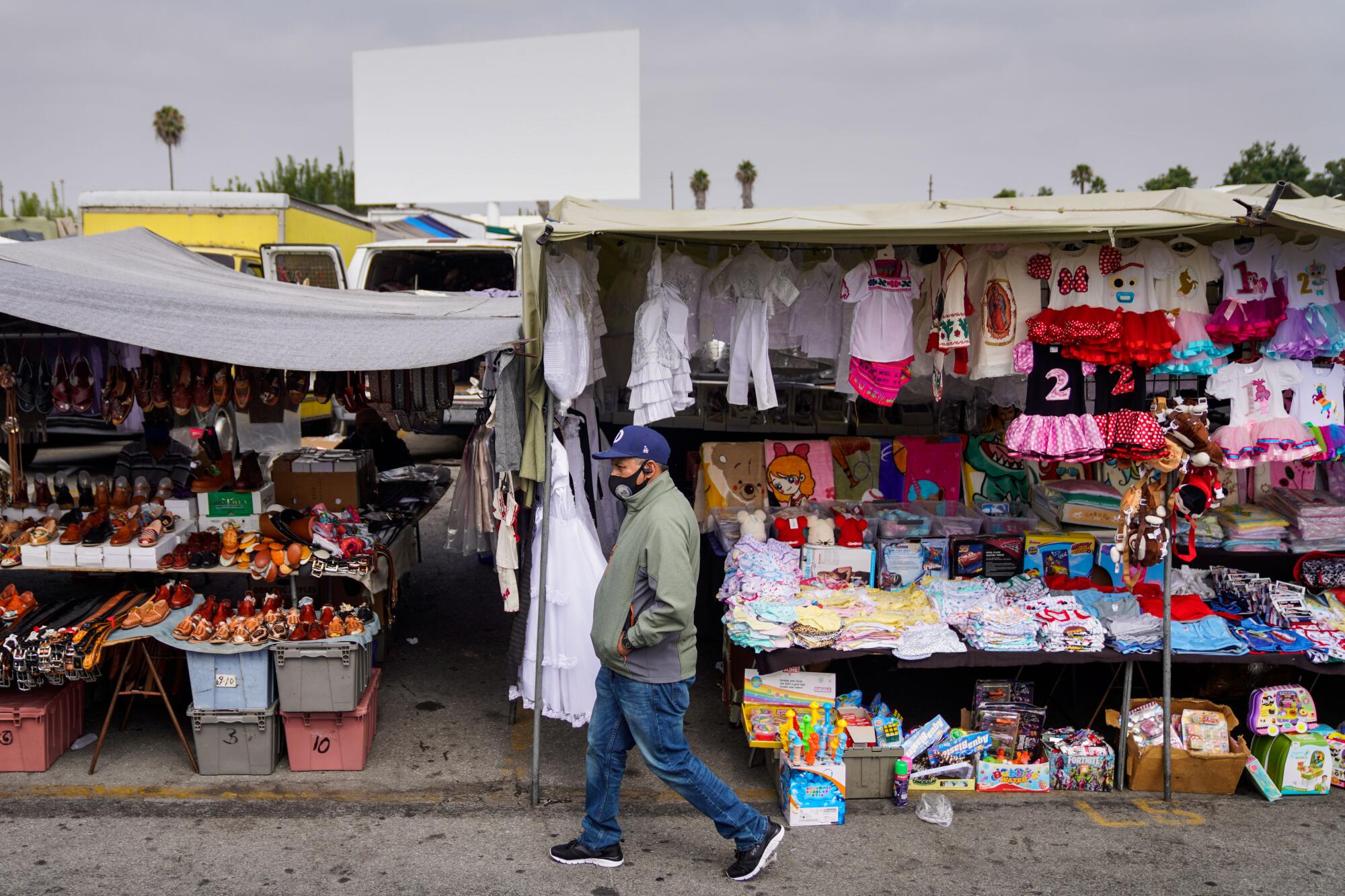
Behind her friendly demeanor, Vargas worried about the rising number of COVID-19 infections in L.A. County and elsewhere in California. She worried about another closure in the future.
“Right now, people don’t want to waste money because of what’s going on,” Vargas said. “With the second wave, people are going to be more cautious.”
But those worries would have to wait. At her stand, Vargas reached for a small black suit jacket and handed it to Pascual. Behind stacks of merchandise, the woman helped her godson pull the slacks up over his jeans. The boy smiled shyly at his godparents, swinging his hips.
The family walked away happily with two suits.
More to Read
Sign up for Essential California
The most important California stories and recommendations in your inbox every morning.
You may occasionally receive promotional content from the Los Angeles Times.


